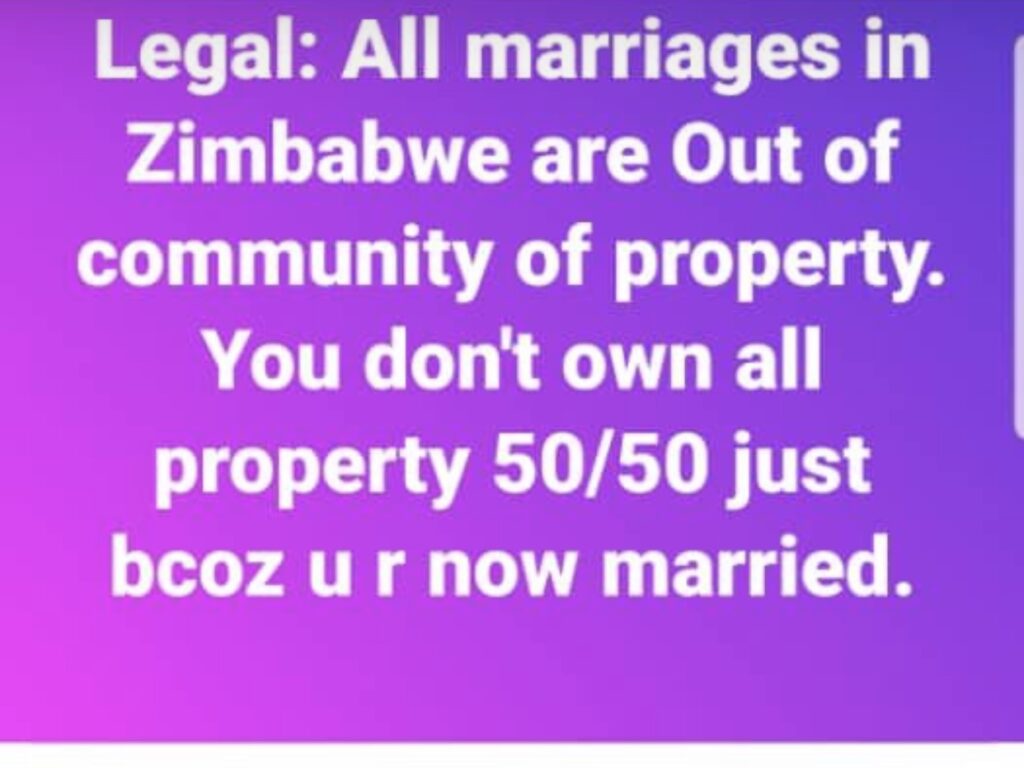CLAIM: All marriages in Zimbabwe are out of community of property. You don’t own all property 50/50 just bcoz u r (sic) now married.
SOURCE: Social media
VERDICT: True

Zimbabwe has 3 different types of marriages that a person can choose from – a monogamous civil marriage, a potentially polygamous qualified civil marriage or a potentially polygamous customary one.
Apart from its monogamous nature, a civil marriage has been seen as ideal due to the belief that it protects women’s property rights in the case of death or divorce.
This has been mistakenly taken by some to mean that in a civil marriage in Zimbabwe assets are owned 50/50.
Background
A mostly ignored law from a different century legislates property rights for married people in Zimbabwe. The Married Persons Property Act commenced on 1 January 1929.
It states in Section 2(1) that:
- Community of property and of profit and loss and the marital power or any liabilities or privileges resulting therefrom shall not attach to any marriage solemnized between spouses whose matrimonial domicile is in Zimbabwe entered into after the 1st January, 1929, unless such spouses shall, by an instrument in writing, signed by each of them prior to the solemnization of their marriage and in the presence of two persons, one of whom shall be a magistrate, who shall subscribe thereto as witnesses, have expressed their wish to be exempt from this Act.
This effectively means that all marriages are out of community of property, unless the couple opts out of this in writing.
The Zimbabwe Woman for Lawyers Association is an organisation that offers free legal advice for women and children’s rights.
It says ‘out of community of property means that there is no automatic joint ownership of property by the parties to a marriage and joint ownership can only be shown through registration. On the contrary, community of property entails that parties own and control the property in equal shares’.

So where did the confusion come from?
Woman who lose their husbands to death or divorce when married under the civil marriage law have, largely, found it easier to execute their late husbands’ estates or inherit matrimonial property. This has led to the mistaken belief that assets in this marriage are owned 50/50.
It is important to note that in the dissolution of a marriage or death of a spouse, different laws come into play. Some of these are the Matrimonial Causes Act, the Marriage Act and the Inheritance law.
Precedents
There have been landmark rulings in Zimbabwe over the years that have dealt with sharing of property in the event of a death, divorce or when a spouse disposes of his/her share in a jointly owned property.
During existence of marriage
The law recognises that during the existence of a marriage one can dispose of their property or even of their share in jointly held ownership. In 2019, in Ishemunyoro vs Ishemunyoro, the Supreme Court ruled that one spouse can dispose of his/her share of a jointly shared property.
Divorce
In 2020, Zimbabwe’s Supreme Court ruled that a judge can award a woman half of all movable and immovable properties when she divorces, regardless of her monetary contribution toward the purchase of those properties.
Death
Under general law, the surviving spouse inherits the matrimonial home and half the goods. The remaining goods are divided between surviving spouse and other dependents.
In a customary marriage, it’s a bit more complicated when there are more than one wives. Each wife keeps her matrimonial home, a third of the estate goes to the wives and from this, the first wife gets two thirds.
This only applies to estates of spouses who died after 1997. For those who died before this date, the estate is administered in the customary way where the eldest son inherited everything.
However, in a landmark ruling in Chigwada vs Chigwada the Supreme Court ruled that spouses can disinherit each other.
In 2020, the Supreme Court ruled that the Married Persons Property Act was the law in use and as such, the law of testamentary disposition does not oblige the one making a will to leave their property to their surviving spouse.
Expert Opinion
Prisca Dube is a human rights lawyer and gender activist. She says there is need for women to familiarise themselves with the law; “You have the Married Persons Act of 1929. Section 2 of that Act makes the default position of marriages in Zimbabwe – all marriages – to be out of community of property.
And then you have the Matrimonial Causes Act sections 7 and 8 which comes in in the late 1980s, 1990s, thereabout, to cure an anomaly because most black man will acquire property just in their names and then upon dissolution of those marriages, women get out with nothing – just kitchen stuff, bedding and their clothes, but nothing of substance from the marriage.”
She added that despite different rulings in the past, the default position of all marriages in the country remains out of community.
“So the Matrimonial Causes Act was meant to cure that and because most judges were feeling sorry for these women, they would end up giving them a substantial amount of the property that was in the man’s name and it created an impression that upon divorce it was 50/50 and, therefore, created an impression that once people are married what is acquired during the subsistence of that marriage is owned 50/50. That is not true. From January 1929, all marriages in Zimbabwe are out of community of property. What is mine is mine, what is his is his and what is ours is what is to be shared unless the provisions of the Matrimonial Causes Act are evoked. So women should stop this business of getting into marriage thinking they will be taken care of, property will be acquired and shared upon the dissolution of a marriage. That is a fallacy,” she said.
Conclusion
The claim that all marriages in Zimbabwe are out of community of property and one does not own all property 50/50 just because they are now married, has been rated as true.
It is important to understand this principle of out of community of property. As ZWLA and Ms Dube explain it, it means that whatever was acquired by a spouse prior to the marriage remains that spouse’s exclusive property with full rights that can be exercised by any owner. In addition, whatever property the parties to a marriage acquire during the subsistence of the marriage is owned by the party in whose name the property is registered with the power to sell or dispose of the property. More often than not, parties to a marriage live under the impression that the properties that they buy or acquire belong to them equally. This is not the case at all. A spouse whose name appears on the registration document of the property has real rights and can dispose the property without knowledge of the other party.











